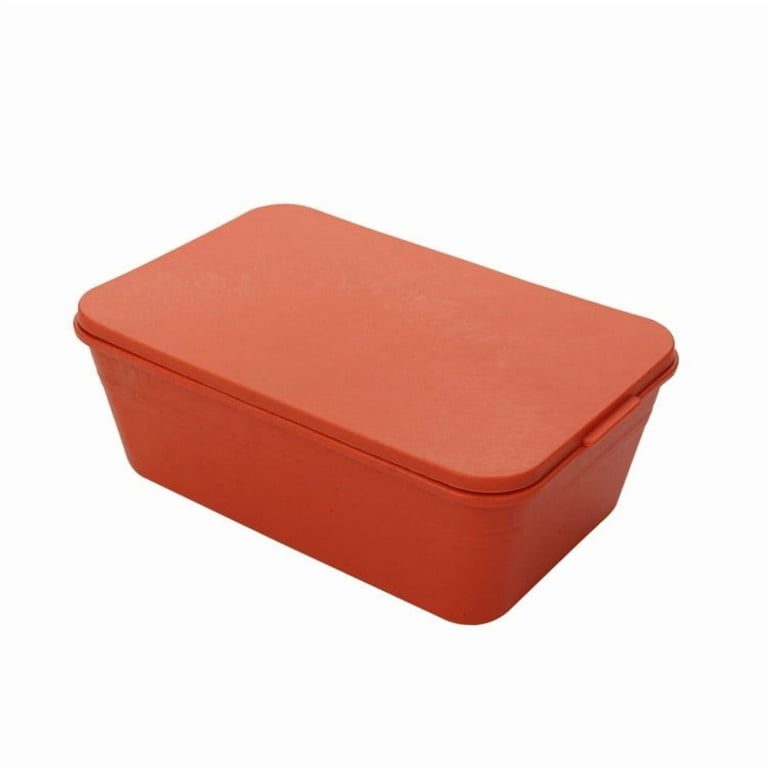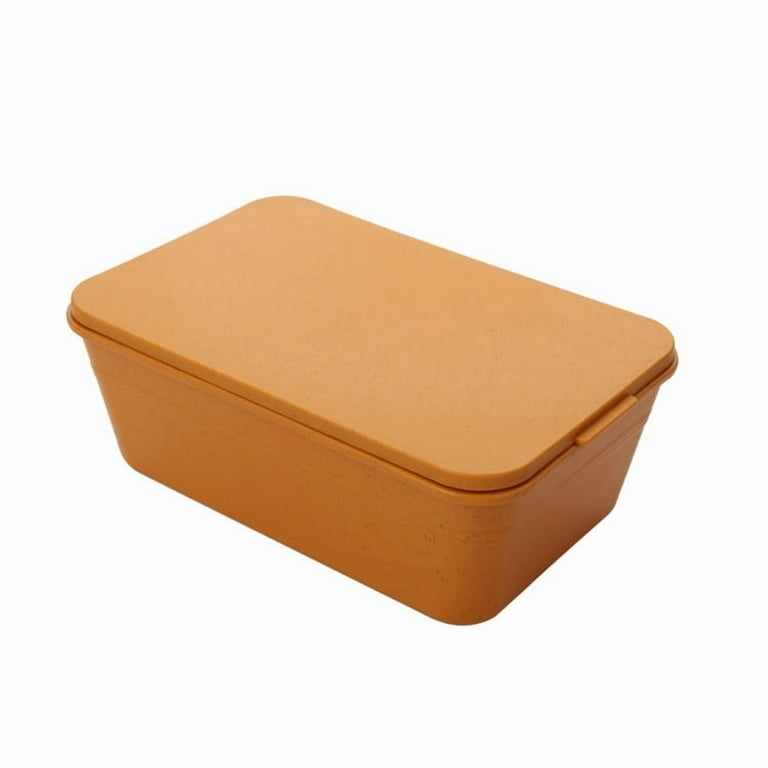Have you ever opened your pantry or fridge only to find your favorite snacks stale or your leftovers spoiled sooner than expected? It’s frustrating to waste food that you worked hard to buy and prepare.
The secret to keeping your food fresh longer might be simpler than you think: airtight containers. These humble kitchen tools create a protective barrier that locks in freshness and flavor while keeping harmful elements out. Imagine your fruits staying crisp, your spices bursting with aroma, and your leftovers tasting just as good the next day.
Curious to know how airtight containers work their magic and which foods benefit the most? Keep reading to discover why these containers are a game-changer for your kitchen and your wallet.

Credit: www.walmart.com
How Airtight Containers Preserve Freshness
Airtight containers play a crucial role in preserving food freshness. They create a strong seal that blocks air and moisture from entering or escaping. This seal helps maintain the food’s original texture, flavor, and nutrients. Using airtight containers slows down spoilage and keeps food safe longer.
Preventing Moisture Loss And Gain
Airtight containers stop moisture from leaving or entering food. Dry foods like flour stay soft and easy to use. Foods that need moisture, like dried fruits, do not become too dry or hard. This balance keeps food in the best condition for longer.
Slowing Down Oxidation And Spoilage
Oxygen causes food to spoil faster. Airtight containers limit air exposure, reducing oxidation. This helps keep flavors and nutrients intact. Coffee, spices, and grains stay fresher and taste better for more time.
Blocking Contaminants And Pests
Sealed containers keep out bacteria, mold, and pests. This is important for pantry items like beans and grains. It also protects leftovers stored in the fridge. Food stays safe and clean, reducing waste.
Reducing Odor Transfer
Strong smells do not escape from airtight containers. This prevents odors from mixing in the fridge or pantry. Spices and other aromatic foods keep their natural scent and flavor. Your kitchen smells fresh and food tastes pure.
Protecting Refrigerated Items
Airtight containers shield food from ethylene gas in the fridge. This gas can make fruits and vegetables ripen and spoil quickly. A good seal keeps food fresh and crisp for days. Leftovers and cut produce stay tasty longer.

Credit: www.amazon.com
Types Of Foods For Airtight Storage
Airtight containers protect many types of food by blocking air and moisture. This keeps food fresh, tasty, and safe longer. They work well for dry and wet foods alike.
Choosing the right container depends on the food type. Some foods need a tight seal to stay crisp. Others need protection from pests or odors. Below are common foods that benefit from airtight storage.
Dry Goods Like Flours And Sugars
Flours and sugars absorb moisture easily. Airtight containers keep them dry and free from clumps. This prevents spoilage and insect damage. It also stops them from hardening or forming lumps.
Grains, Beans, And Legumes
Grains, beans, and legumes last longer in sealed containers. Air exposure causes them to lose flavor and nutrients. Airtight storage stops bugs and moisture from ruining these staples. It keeps them fresh for months.
Spices And Herbs
Spices and herbs lose aroma when exposed to air. Airtight containers lock in their natural fragrance and flavor. This keeps them potent and tasty. It also prevents contamination from other strong odors.
Dried Fruits And Snacks
Dried fruits and snacks stay chewy and flavorful in airtight containers. These containers stop them from drying out further. They also keep pests and dust away. Snacks remain crisp and enjoyable longer.
Leftovers And Cooked Meals
Leftovers and cooked meals keep their taste and texture in airtight containers. The seal stops air from making food soggy or stale. It also prevents bacteria growth by limiting oxygen. Food stays safe to eat for days.
Materials And Designs Of Airtight Containers
Airtight containers come in various materials and designs that affect how well they keep food fresh. Choosing the right type helps maintain taste, texture, and nutrition. These containers block air, moisture, and pests from reaching your food. The material and lid design play a key role in this protection.
Glass Vs Plastic Containers
Glass containers do not absorb odors or stains. They are sturdy and safe for microwave or oven use. Glass keeps food fresh without chemical leaching. Plastic containers are lighter and less fragile. Many plastics are BPA-free and designed for food storage. Plastic containers may stain or retain smells over time. Both types can be airtight but glass often offers a better seal.
Seal Mechanisms And Lid Types
Some airtight containers use silicone gaskets to create a tight seal. Snap-lock lids clamp down to prevent air entry. Twist-on lids screw tightly for a secure closure. Some lids have valves that remove excess air. A strong seal blocks oxygen and moisture from spoiling food. The lid design affects ease of use and freshness retention.
Size And Stackability Considerations
Containers come in many sizes for different storage needs. Small containers fit spices and snacks well. Large containers hold bulk items like flour or rice. Stackable designs save space in cabinets or refrigerators. Uniform shapes make stacking easier and more stable. Choose sizes that match your food portions to reduce waste.
Common Mistakes To Avoid
Airtight containers help keep food fresh longer, but mistakes can reduce their benefits. Avoid these common errors to maximize freshness and avoid spoilage. Proper use ensures your food stays tasty and safe.
Storing Warm Or Moist Food
Placing warm or moist food in airtight containers causes condensation. Moisture creates a perfect environment for bacteria and mold growth. Always cool food before sealing it. This prevents extra moisture inside the container.
Ignoring Container Cleanliness
Dirty containers hold bacteria and odors. Using unclean containers contaminates fresh food quickly. Wash containers and lids thoroughly before each use. Dry them well to avoid leftover moisture.
Using Damaged Seals
Airtight seals keep air and moisture out. Damaged or worn seals let air in, defeating the container’s purpose. Check seals regularly for cracks or tears. Replace containers or lids with broken seals to maintain freshness.
Special Considerations For Safety
Using airtight containers helps keep food fresh longer, but safety matters too. Sealing food blocks air and pests, but some risks still exist. Proper care prevents harmful bacteria and spoilage. Understanding safety ensures you enjoy fresh, safe food every time.
Risks Of Anaerobic Bacteria
Airtight containers limit oxygen, which slows many bacteria. Some bacteria, called anaerobic bacteria, grow without oxygen. These bacteria can cause food poisoning if food is left too long sealed. Foods like cooked rice or meats need careful handling in airtight containers.
Always cool cooked foods quickly before sealing. Avoid keeping leftovers sealed at room temperature for hours. This reduces the risk of dangerous bacteria growing inside airtight containers.
Proper Storage Temperatures
Temperature controls bacteria growth better than sealing alone. Store perishable foods in cool places. Room temperature allows bacteria to multiply fast, even in airtight containers.
Dry goods like grains and flour stay safe at room temperature in airtight containers. Cooked or fresh foods need refrigeration to stay safe. Keep your fridge at or below 40°F (4°C) for best results.
When To Use Refrigeration Or Freezing
Use refrigeration for leftovers, fresh fruits, and vegetables. Airtight containers keep moisture and odors in the fridge controlled. Freezing is best for long-term storage of meats, bread, and cooked meals.
Before freezing, cool food completely and use freezer-safe airtight containers. Label containers with dates to track freshness. Frozen airtight containers prevent freezer burn and keep food safe.

Credit: www.walmart.com
Tips For Maximizing Freshness
Maximizing the freshness of your food stored in airtight containers requires smart habits. Small efforts can greatly extend shelf life. These tips help keep food tasty and safe for longer periods.
Labeling And Rotation
Label containers with the contents and date stored. This practice prevents confusion and waste. Use older items first by following the “first in, first out” method. Rotate containers regularly to maintain freshness and avoid spoilage.
Using Uniform Container Sets
Choose containers of the same brand and style. Uniform sets stack neatly, saving space and reducing clutter. They seal consistently, ensuring airtight protection. This simple step improves storage efficiency and food preservation.
Avoiding Frequent Opening
Open containers only when necessary. Each opening lets air inside, reducing freshness. Plan portions ahead to limit exposure. Keeping containers closed maintains a strong seal and slows spoilage effectively.
Frequently Asked Questions
Do Airtight Containers Make Food Last Longer?
Yes, airtight containers extend food life by blocking air, moisture, and contaminants. They preserve flavor, texture, and nutrients.
Why Do We Keep Food In Airtight Containers?
We keep food in airtight containers to block air, moisture, and pests, preserving freshness and preventing spoilage.
Can Bacteria Grow In An Airtight Container?
Bacteria can grow in airtight containers, especially anaerobic types like Clostridium botulinum. Proper storage and refrigeration reduce risks.
Does Food Last Longer With No Oxygen?
Food lasts longer without oxygen because it slows oxidation, moisture loss, and bacterial growth, preserving freshness and flavor.
Conclusion
Airtight containers play a key role in keeping food fresh longer. They stop air, moisture, and pests from reaching your food. This simple step helps preserve flavor, texture, and nutrients. You can store dry goods, leftovers, or spices safely. Using airtight containers reduces waste by extending shelf life.
Choose containers that seal well and fit your needs. Small changes in storage make a big difference in food freshness. Keep your food fresh, tasty, and safe with airtight storage.

